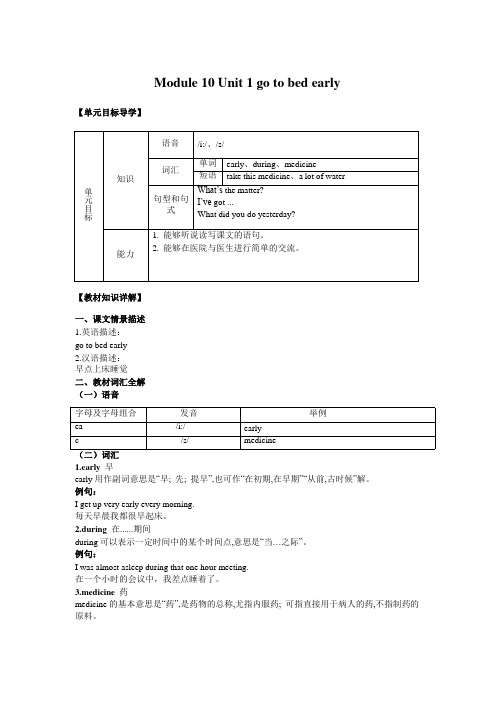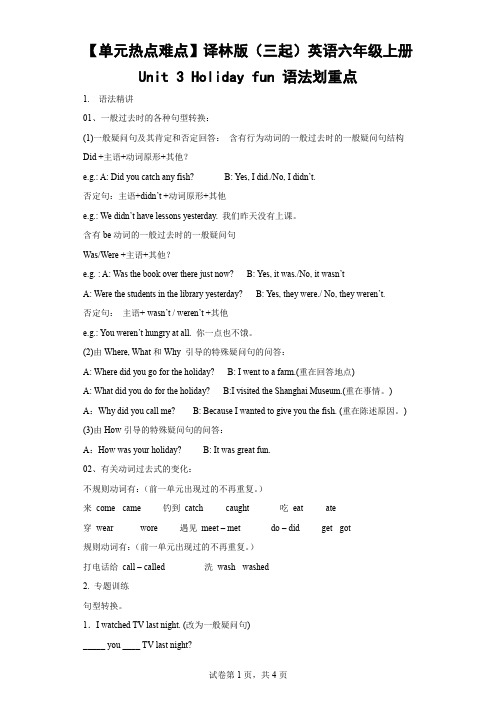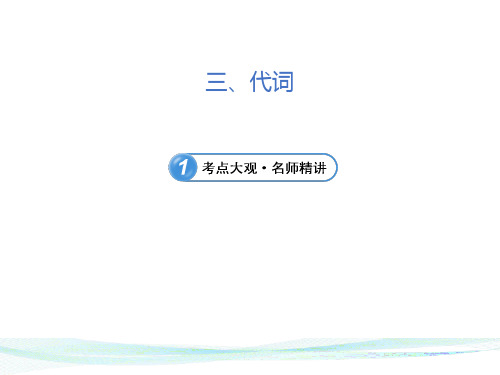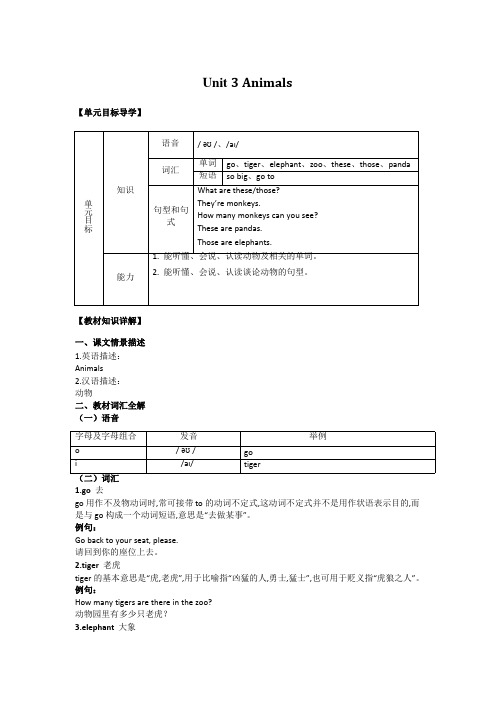小学英语精讲精析 Where did you go
小学英语精讲精析 go to bed early

知识点名称 句型、交际用语
知识点内容 What’s the matter? I’ve got a cold. What did you do yesterday? I played computer games.I went to bed late.
Take this medicine.Drink a lot of water.
I was almost asleep during that one hour meeting. 在一个小时的会议中,我差点睡着了。
3.medicine 药 medicine 的基本意思是“药”,是药物的总称,尤指内服药; 可指直接用于病人的药,不指制药的 原料。
例句:
Take this medicine three times a day. 这种药一天吃三次。 三、课文内容全译 early 早、during 在......期间、medicine 药
My name is Mary. I am eleven. Ted is my brother. He is thirteen. We are in the same school. My
mother is a teacher. She is a teacher in our school. My father is a teacher, too. He is a Chinese teac
Module 10 Unit 1 go to bed early
【单元目标导学】
语音 /i:/、/s/
知识
词汇
单词 early、during、medicine 短语 take this medicine、a lot of water
单
What’s the matter?
【单元热点难点】译林版(三起)英语六年级上册Unit 3 Holiday fun 语法重点(含解析)

【单元热点难点】译林版(三起)英语六年级上册Unit 3 Holiday fun 语法划重点1. 语法精讲01、一般过去时的各种句型转换:(1)一般疑问句及其肯定和否定回答:含有行为动词的一般过去时的一般疑问句结构Did +主语+动词原形+其他?e.g.: A: Did you catch any fish? B: Yes, I did./No, I didn’t.否定句:主语+didn’t +动词原形+其他e.g.: We didn’t have lessons yesterday. 我们昨天没有上课。
含有be动词的一般过去时的一般疑问句Was/Were +主语+其他?e.g. : A: Was the book over there just now? B: Yes, it was./No, it wasn’tA: Were the students in the library yesterday? B: Yes, they were./ No, they weren’t.否定句:主语+ wasn’t / weren’t +其他e.g.: You weren’t hungry at all. 你一点也不饿。
(2)由Where, What和Why 引导的特殊疑问句的问答:A: Where did you go for the holiday? B: I went to a farm.(重在回答地点)A: What did you do for the holiday? B:I visited the Shanghai Museum.(重在事情。
)A:Why did you call me? B: Because I wanted to give you the fish. (重在陈述原因。
)(3)由How引导的特殊疑问句的问答:A:How was your holiday? B: It was great fun.02、有关动词过去式的变化:不规则动词有:(前一单元出现过的不再重复。
语法精讲--- 代词

You’ll find it interesting to be with us. 你会发现和我们相处很有趣。
考点五 指示代词、疑问代词 1.般用来指在时间或空间上较近的事物或人。
Toys! These are my toys! 玩具!这些是我 的玩具!
5. one/it的用法比较 one 代指上文中提到的同类事物中的一个(非原物)
it 代指上文中提到的同一事物(原物) Joe has a pet dog. It’s very lovely. I want to have
one like it, too. 乔有只宠物狗,它很可爱。我也想拥有一只 像它一样的(小狗)。
形容词性物主代词与名词性物主代词的区别:
词类 形容词性 物主代词
名词性物 主代词
区别
例句
位于名词前,用作定
语,限定该名词的意
义
May I use your pen?
在句子中充当主语、 Yours works better.
宾语或表语,相当于 我可以用你的钢笔吗?你
“形容词性物主代词 的更好用。
+名词”,后面不能
指前面讲到过的事物。 I had a cold. That’s why I didn’t those come. 我感冒了。那是我没来的原因。
有时为了避免重复提到的名词,常用that或 those代替。 Television sets made in Beijing are just as good as those made in Shanghai. 北京制造的电视机和上海制造的一样好。
常见不定代词的用法
1. some/any的用法比较
人教版八年级上册英语 Unit 1 Section A (1a-2d) 授课课件

是指某些人或物中的“任何一个”,用来表明只限一个
辨析:anyone, anybody与anyone
都指“任何人”,其后一般不接 anybo of,作主语时,谓语动词用第三
dy, 人称单数形式。 anyon 后面不可接动词的否定形式;如
e 果要表达全部否定, 主语用 nobody。 是指某些人或物中的“任何一
.
课文呈现
1c. Makeconversationsaboutthepeopleinthepicture. A:WheredidTinagoonvacation? B:Shewenttothemountains.
课文呈现
People Grace Kevin Julie
Places
Thebeach Home
考点精讲
考点5 quiteafew相当多;不少
修饰可数名词 复数,相当于 many和quite a lot of。
e.g. Quiteafewstudentsgotoschoolbybike.
相当多的学生骑自行车上学。
拓 展 : quitealittle 表 示 “ 相 当 多 ; 不 少 ” , 相 当 于
考点精讲
③Oh, didyougoanywhereinteresting?
考点3 (重点)anywhere/'eniweə/adv. 在任何地方 形容词修饰复合不定代词、不定副词时,位于不定 代词、不定副词的后边。
anywhere常用于否定句和疑问句中,表示“在任何 地方”;如果用在肯定句中,表示“在(或去)任 何地方,随便哪个地方”。
? Grace: Yes. I went with my mother. Boy: Did you go to Central Park? Grace: Yes, I did. It was really nice. Boy: Did you buy anything special? Grace: Yes. I bought something for my f
小学英语精讲精析 Animals (2)

Take these books to his room, please. 请把这些书拿到他的房间去。 6.those 那些 用作代词 例句:
【解析】panda 的意思是熊猫,其余两项是代词。
4.【答案】B 【解析】see 的意思是看见,其余两项是颜色。
I can sing and she can dance. 我会唱歌,她会跳舞。 10.big 大的 big 作“大”解时,形容物时指体 new hospital is very big. 那家新的医院很大。 三、课文内容全译
go 去、tiger 老虎、elephant 大象、zoo 动物园、these 这些、those 那些、can 能、能够
How many tigers are there in the zoo? 动物园里有多少只老虎?
3.elephant 大象
elephant 是可数名词,它的基本意思是“象”。a herd of elephants 表示“一群象”。 例句:
The elephant has a long nose. 大象有一个长长的鼻子。 4.zoo 动物园 zoo 的意思是“动物园”,是正式用语 zoological garden 的缩略词,指饲养各种动物并向公众开放 参观的园地,多用在口语中。 例句:
How many pencils do you have? 你有多少只铅笔?
【相关话题拓展】
指示代词的用法
1. this 和 these 一般指在空间和时间上较近的事物,that 和 those 一般指在空间和时间上较 远的事物。 例:This is a map of China and that is a map of the world。 这是一张中国地图,那是一张世界地图。 2. this 和 these 常指后面将要讲到的事物,有启下的作用,that 和 those 常指前面已经讲到 过的事物,起承上的作用。 例:I shall say this to you: he is an honest man.
六年级英语下册知识讲义-语法精讲(Units 4- 6 复习)-湘少版

学习目标1. 能够掌握动名词作主语的用法。
2. 能够掌握一般将来时的含义和用法。
3. 能够掌握形容词作宾语补足语的用法。
4. 能够掌握一般过去时的含义和用法。
重点:能够运用动名词作主语,形容词作宾语补足语来正确描述物体。
难点:熟练运用一般将来时和一般过去时表达过去和将来发生的事情。
考点精讲1. Planting trees is good for us. 植树对我们有益。
本句中的主语是动名词短语planting trees。
当动名词(短语)作主语时,谓语动词用单数形式。
Exercising is good for our health. 锻炼对我们的健康有益。
_________ every day ________ a good habit.A. Read; isB. Reading; isC. Reading; are答案:B思路分析:句意为“每天阅读是一个好习惯。
”作主语的应为动名词;且动名词短语作主语时,谓语动词用单数形式,故选B项。
2. I will plant trees. 我将种树。
本句是含有一般将来时的肯定陈述句。
一般将来时由“助动词will +动词原形”构成。
助动词will没有人称和数的变化。
He will go to the cinema this evening. 今天晚上他将去看电影。
—_________ they play the piano for tomorrow’s party?—Yes, they _________.A. Do; doB. Did; didC. Will; will答案:C思路分析:根据“tomorrow’s party”可知时态用一般将来时,故选C项。
3. Trees can keep the air clean. 树木可以保持空气清新。
Trees can make the place beautiful. 树木可以让这个地方美丽。
keep the air clean 和make the plane beautiful都是“动词+宾语+形容词”结构。
小学英语精讲精析 Did you see it
Module 7 Unit 2 Did you see it?【单元目标导学】【教材知识详解】一、课文情景描述1.英语描述:Did you see it?2.汉语描述:你看到它了吗?二、教材词汇全解(二)词汇1.found 发现found主要用作及物动词,其后可接学校、城堡、医院、公司、机构、组织、国家等名词或代词作宾语。
可用于被动结构。
例句:When I got there, I found him out.当我到那儿时,发现他出去了。
2.key 钥匙key是可数名词,基本意思是开房门、箱子等和上钟表发条等的“钥匙”例句:Have you got the key to this door?你有这扇门的钥匙吗?四、课文句型讲解1. Did you look for it in your bag? 你在你的包里寻找它了吗?一般过去时的一般疑问句:在陈述句中只有行为动词的过去式,那就得在句首加上一个助动词did来帮助提问,然后把句中的行为动词由过去式改为动词原形,并在句末打上问号。
例句:Did you see it?你看到它了吗?2. I lost my key. 我丢失了我的钥匙。
一般过去时的结构:主语+动词的过去式例句:Bob took it away.鲍勃拿走了它。
【相关话题拓展】一般过去式的构成形式【单元知识总结】【单元测评】一、单选题1. There are many green ____________in the trees.A.the leavesB. leafC.leavesD.a leaves2. Before you shut your computer, don’t forget to ______________this document.A.clickB.saveC.openD.closed3. Tony ___________birthday parties.A.likes alwaysB. always likesC.always likeD.usually like4. This is a wolf, and it’s _____________European wolf.A.theB.aC.anD.one5. Let’s ____________football on the playground.A. playB. to playC. playedD. playing二、下列句子找到合适的答语。
小学英语精讲精析 After school (2)
Unit 7 After schoolThe first period: Read and say1. Classes are over. 放学了。
(所有的课程都结束了。
)【剖析】over有三种常见的意义:1). 作副词意为“结束,完了”。
例如:School is over. 放学了。
2). 作介词意为“超过(某时间.数量.价钱等)”。
例如:There are over five hundred students in our school. 我们学校有五百多名学生。
3). 作介词意为“从某物的一边到另一边,在。
上”。
例如:The black car is going over the bridge. 那辆黑色的小轿车正通过那座桥。
【典型例题】( ) — Where's my dog?It's ____ there.A.atB.inC.over【解析】C over there. 在那边。
( ) — How many books do you have?— ___ ten.A.OverB.InC.At【解析】A Over ten,10多本. 在这里over的意思是“超过;多于”,相当于more than.2. He and Mike are in the playground, I think. 我想他和麦克在操场。
【剖析】1). in the playground 在操场2). …… , I think 在此做插入语,意为“我想。
;我认为。
”。
I think 也可以置句首,这时不用逗号。
例如:I think my mother is doing housework now. 我想我妈妈现在正在做家务。
【典型例题】( ) —— Are you able to come to our party tomorrow?——I ____ so. What time?A. thinkB. thinkingC. thought【解析】A so= I am able to come to your party tomorrow.3. I’ll go and join them. 我要去加入到他们中。
小学英语精讲精析 Big bird
口语交际
1、当你想让别人看某样东西时,可以用这样的句子:Look at that tree. 2.当你要求别人不要做某事时,你可以用这样的句子:Don’t touch
her. 3.当你请求别人帮助时,你可以说:Please help me! 4.当你对某人或某事表示感激时,你可以说:Thank you.而对方可以 说 You’re welcome.
— May I use your dictionary? 我可以用用你的字典吗?
— Certainly. You're welcome. 当然可以,随便。 辨析: Not at all 是口语中一个十分常见的表达,由于其实际意思往往与其字面意思相去 甚远,所以许多同学常常用错。
1、用于回答感谢,意为“不用谢;不客气” 。 2、用于回答带有感谢性质的客套话。意为“没什么;哪里哪里” 。 3、用于回答道歉,意为“没关系” 。四、用来表示否定(是 No 的加强说法),意 为“一点也不:完全不” 。
13.help 帮忙 15. welcome 欢迎
17.short 短的 19.fat 肥的 21.gate 门 23.page 页 25.garden 公园
14. bad 坏的 16.happy 快乐的
小学英语精讲精析 What do you like doing
Module 9 Unit 2 What do you like doing?1.What do you like doing?你喜欢干什么?I like ... (doing something).我喜欢...What do you like doing in your spare time?你在闲暇时喜欢做什么?What do you like doing? I like riding my scooter.你喜欢做什么?我喜欢骑滑板车。
2.Does Xiaoqiang like ... (doing sth)?Yes, he does. /No, he doesn’t.注意:.陈述句中只有一个实义动词作谓语且其时态为一般现在时,变为一般疑问句时要在句首加do或does 主语后的实义动词用原形。
如:I like these animals.→Do you like these animals﹖She wants to go to the movies.→ Does she want to go to the movies﹖1. I like ________ (eat)bananas.答案:eating解析:like doing sth表示长时间的喜欢做某事,指兴趣爱好。
不指某一次动作。
I like ________( swim) this afternoon. Would you like _______ (come)with me?答案:swimming to come解析:Would like to do表示意愿。
like to do sth 则常指某个具体的动作,想去做某事。
- 1、下载文档前请自行甄别文档内容的完整性,平台不提供额外的编辑、内容补充、找答案等附加服务。
- 2、"仅部分预览"的文档,不可在线预览部分如存在完整性等问题,可反馈申请退款(可完整预览的文档不适用该条件!)。
- 3、如文档侵犯您的权益,请联系客服反馈,我们会尽快为您处理(人工客服工作时间:9:00-18:30)。
Module 8 Unit 2 Where did you go?
1.holiday假期
Where did you go on your holiday?
你假期去了哪里。
2.yesterday昨天
Yesterday was a holiday.
昨天是假日。
3.go out 外出
I didn't go out.
我没有外出。
4.stay at home呆在家
I stayed at home.
我呆在了家里。
5.hear听见
What did you hear?
你听到什么了?
6.dear亲爱的
My dear,how are you?
亲爱的,你最近怎么样?
7.询问人家过去做了什么,看见了什么,听到了什么,去了哪里,什么时候回来。
一般用
What/when/where+did 特殊疑问词加did
What did you do yesterday?
昨天你做了什么?
When did you come back?
你什么时候回来的?
Where did you go?
你去了哪里?
1.—Where______ you _______just now?
—I _____ to the teachers’ office.
A. do, go, went
B. did, go, went
C. did, go, go
D. do, go, go
【答案】B
【解析】由just no可知是询问过去刚刚发生的事。
2.I like _____the piano. But I ____ no time this morning.
A. playing, have
B. play, had
C. playing, had
D. play, have
【答案】C
【解析】前句说的一般情况,后句说的是今天早上,并且是已经发生的事。
用所给动词的适当形式填空。
1. We ______ (live)in Japan last year.
2. Susan_______ (stop)the car on the street yesterday.
3. My mother_______ (clean)my room and ______(study)for the English test last Sunday.
4. What ______ you ______(do)last night?
5. On Saturday morning I _____(play)football.。
